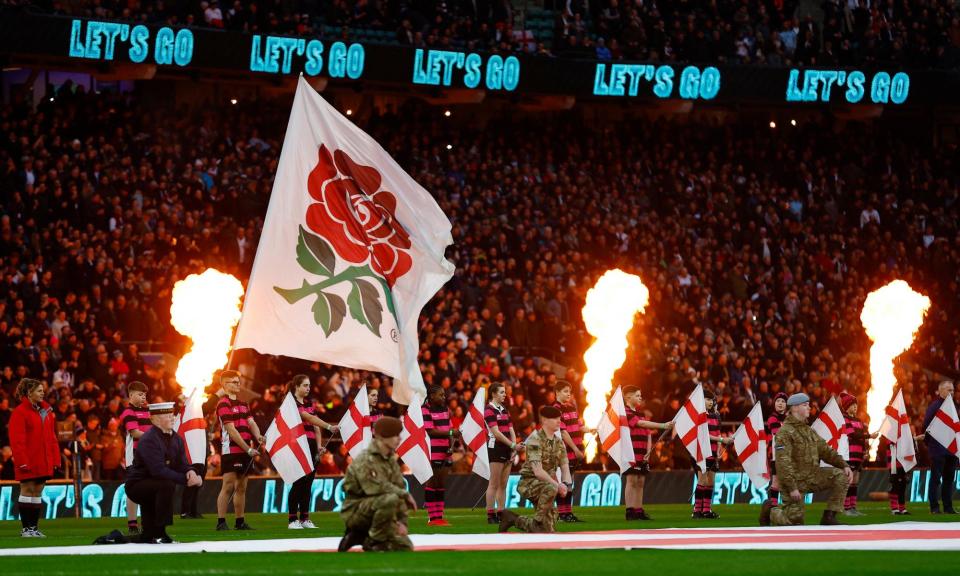England seek elevated Twickenham experience – on and off the field

An unchanged team-sheet does not, in England’s case, mean settling for the status quo this weekend. Across the board, from players to casual fans, there is an acceptance the Twickenham atmosphere needs to change – and soon. The last time the national team played at home, against Fiji in the buildup to the Rugby World Cup, the rows of empty seats said it all even before England lost the actual game.
The Six Nations is always a slightly different beast, with the travelling Welsh choirs available to give the visiting anthem a passionate extra edge. But when the Guardian reported last month that England’s new captain, Jamie George, and his players had submitted several suggestions to the Rugby Football Union to try to improve the vibe in and around the stadium on big international days, social media was not slow to suggest numerous areas that could, or should, be addressed.
Related: England keep faith with Six Nations starting XV for Wales showdown
“Ticket prices and getting in and out of the stadium need fixing.” “The last two years has seen Twickenham turn into a pissheads’ heaven.” “Stop kicking the ball away.” Clearly there is not one instant one-size-fits-all solution – perhaps tellingly, the RFU declined to make any of its administrators available for comment on Thursday – but the first steps are being taken towards something more uplifting.
Some will be in house and out of sight, some more obvious and inclusive. As they had requested, the team will be taking a slightly longer ‘fan walk’ through the West car park to the dressing rooms before the game, although the logistics have proved trickier than anticipated. “It has been extended – which I’m really happy about – but there are some security issues,” reported George. “We can’t go right back to the gate because I think there are boardings up so we’d be walking past no one … that doesn’t make a huge amount of sense.”
Inside the dressing room, too, the players will find their recent new caps’ names already up on the honours board and more personal messages by their pegs. “We’ve done a few bits in around the changing room which I think will make things feel a lot more special,” reported George, genuinely determined to play a part in enhancing the experience for all involved. “I’ve been very outspoken – as have the boys – about the fact we want Twickenham to feel different. We fed [some ideas] back to the powers that be and a few of them have been taken on board which is great.”
Emerging into the stadium bowl will also involve no shortage of emotion. England’s mascots will be four-year-old Billy Thompson, who has been diagnosed with a brain tumour, and his six-year-old sister, Maddie. Their father Jamie is a player and coach at Effingham and Leatherhead RFC and a sense of the rugby community rallying around will be palpable. There will then follow a moment of applause for, among others, departed Welsh legends Barry John, JPR Williams and England’s Mike Weston, another heartfelt moment that needs no artificial PA enhancement.
It is such moments, reckons George, that elevate Test match days to another level. “For us, having the ability to put a smile on someone’s face is a huge privilege. Walking into that wall of noise – these are things we’ve spoken to the RFU about. It’s not going to be the finished product on Saturday [but] we’ll want to see what went well and what didn’t. As players we will be reflecting on it, going back to the RFU and seeing if we can build on that and enhance the experience.”
On that front, it is probably worth mentioning that mass booing at Twickenham is not entirely a recent phenomenon. Old-timers reckon it was first heard in the 1957-58 season when Australia’s Jim Lenehan slid knee first into England’s Peter Thompson, who had already been flattened by a tackle, and was subsequently booed whenever he touched the ball. “The booing was of an ugliness even old campaigners could not recall previously at Twickenham,” wrote Denys Rowbotham, the Guardian correspondent of the day.
On the other hand, as Harlequins have proved with their brilliantly-staged annual Big Game, Twickenham can rock to an entirely different beat. Quins’ innovative chief executive, Laurie Dalrymple, stresses that international games traditionally attract a different clientele but he still believes England games could be transformed. “Quite clearly something has got to change,” says Dalrymple, referring to England’s uneasy recent relationship with their matchday patrons.
Related: Under the radar: how Richard Hill is key to England’s next generation | Gerard Meagher
“I can’t comment on the RFU’s culture but at Quins we set out to be bold, innovative and unafraid of failure. There’s no doubt about it … the price point is crucial. I get the profitability argument around big Twickenham internationals but would they be prepared to make a proportion of their ticket base suddenly more accessible and affordable? I think there definitely needs to be a willingness to embrace new audiences. For example, I bet there’s a high crossover between people going to both the Wales and the Ireland games.”
Top music acts, light shows, fireworks … the modern fan experience, reiterates Dalrymple, is not solely about the rugby. “Winning is a big help, as is having an identity, but you have to give fans some peripheral experience as well. That’s ultimately going to shift the dynamic of who comes through the door.” In the end, though, George knows exactly where the buck stops. “If we want to create an intimidating environment at Twickenham then first and foremost we have to be physical, confrontational and aggressive. Ultimately, as players, we’ve got a responsibility to put in a performance people are proud of. And if we do that … that’s the sort of environment we want Twickenham to be.” Starting, in theory, on Saturday.

